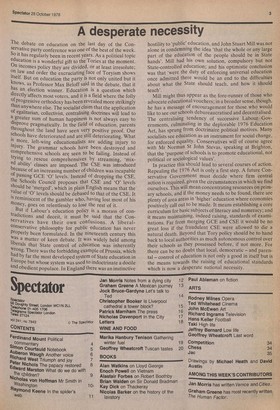A desperate necessity
The debate on education on the last day of the Conservative party conference was one of the best of the week. So it has regularly been in recent years. As a political topic education is a wonderful gift to the Tories at the moment. On incomes policy they are divided, or at least irresolute; on law and order the excruciating face of Toryism shows itself. But on education the party is not only united but it knows, as Professor Max Betoff said in the debate, that it has an election winner. Education is a question which directly affects most voters, and it is a field where the folly of progressive orthodoxy has been revealed more strikingly than anywhere else. The socialist claim that the application of egalitarian, collectivist, centralising. doctrines will lead to a.greater sum of human happiness is not always easy to disprove pragmatically. In the field of education, parents throughout the land have seen very positive proof. Our schools have deteriorated and are still deteriorating. What iS .more, left-wing educationalists are adding injury to injury. The grammar schools have been destroyed and Comprehensive schools are seen to be failing. Instead of trying to rescue comprehensives by streaming, 'mixed ability' classes are imposed. The CSE was introduced because of an increasing number of children was incapable of passing GCE '0' levels. Instead of dropping the CSE, the Schools Council proposes that CSE and '0' levels Should be 'merged', which in plain English means that the yalue of '0' levels should be debased to that of the CSE. It Is reminiscent of the gambler who, having lost most of his money, goes on relentlessly to lose the rest of it. But if Labour's education policy is a morass of contradictions and deceit, it must be said that the Conservatives have their own confusions. A liberal Conservative philosophy for public. education has never Properly been formulated. In the nineteenth century this v.■tas a matter of keen debate. It was widely held among liberals that State control of education was inherently Wrong. There was the forbidding example of Prussia, which had by far the most developed system of State education in Europe but whose system was used to indoctrinate a docile and obedient populace. In England there was an instinctive hostility to 'public' education, and John Stuart Mill was not alone in condemning the idea 'that the whole or any large part of the education of the people should be in State hands'. Mill had his own solution, compulsory but not State-controlled education; and his optimistic conclusion was that 'were the duty of enforcing universal education once admitted there would be an end to the difficulties about what the State should teach, and how it should teach'. Mill might thus appear as the fore-runner of those who advocate educational vouchers; in a broader sense, though, he has a message of encouragement for those who would like to see our schools debureaucratised and decentralised. The centralising tendency of successive Labour Governments, culminating in the deplorable 1976 Education Act, has sprung from doctrinaire political motives. Many socialists see education as an instrument for social change, for enforced equality. Conservatives will of course agree with Mr Norman St John Stevas, speaking at Brighton, that the 'purpose of schools is to promote educational, not political or sociological values'. In practice this should lead to several courses of action. Repealing the 1976 Act is only a first step. A future Conservative Government must decide where firm central action is re,quired, given the circumstances in which we find ourselves. This will mean concentrating resources on primary schools, and if the money needs to be found, there are plenty of area areas in 'higher' education where economies positively call out to be made. It means establishing a core curriculum for basic subjects of literacy and numeracy; and it means maintaining, indeed raising, standards of examinations. Far from merging GCE and CSE it would be no great loss if the fraudulent CSE were allowed to die a natural death. Beyond that Tory policy should be to hand back to local authorities as much autonomous control over their schools as they possessed before, if not more. For there can be no doubt that local, democratic — and parental — control of education is not only a good in itself but is the means towards the raising of educational standards which is now a desperate national necessity.






































 Previous page
Previous page